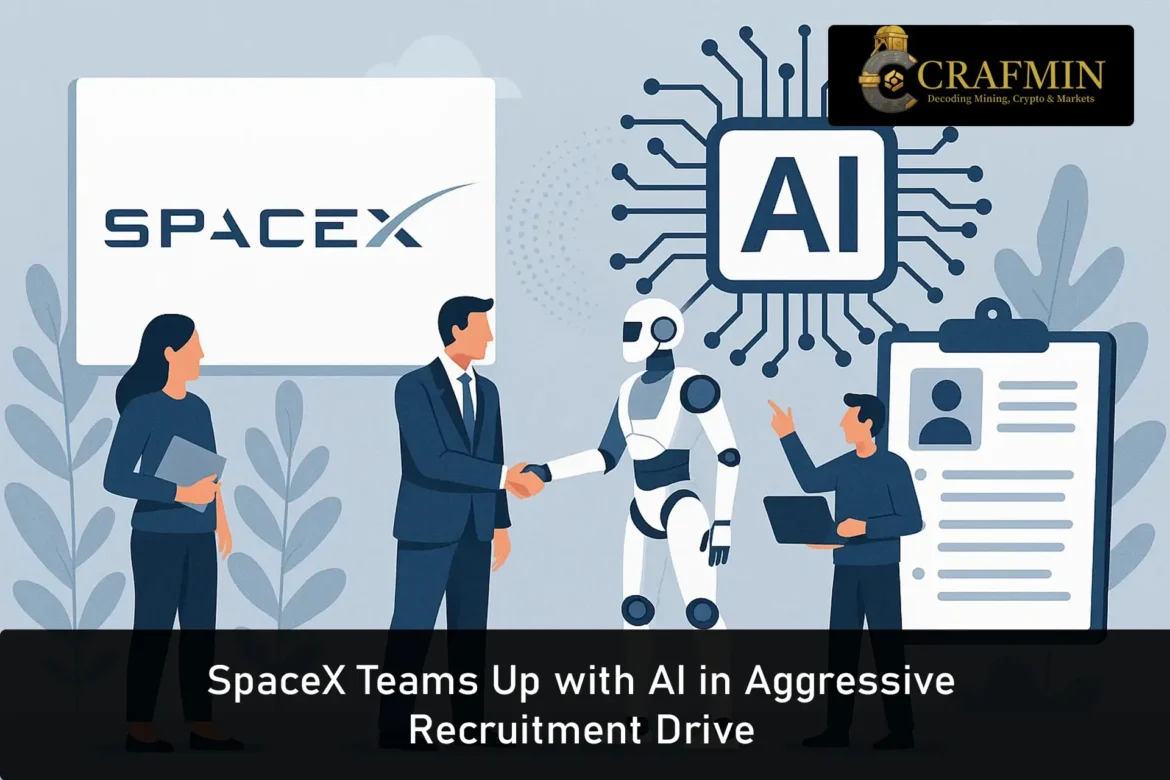SpaceX has started a high-profile recruitment drive, with AI engineering roles offering up to US$170,000. It’s a change from an organization which has downplayed the real-world uses of AI in space technology in the past.
The new roles vary from satellite operations and Starlink to launch vehicles and software testing. The push is a testament to the growing role of smart systems in Elon Musk’s wider tech vision.
Now we have not Tesla, but SpaceX investing $2bn in xAI. pic.twitter.com/jB4NhD1vNn
— jefke (@jefke00) July 14, 2025
From Scepticism to Complete Commitment
Elon Musk tweeted recently that SpaceX employed “basically no AI.” His earlier comments used to belittle the scope for AI in resolving difficult aerospace challenges. But that perspective is now changing quickly.
With Musk now pouring billions into his own AI startup, xAI, and rolling that out across his business empire, SpaceX is certainly on a different path, one where AI is not just allowed but essential.
Where Engineers Will Make a Difference
SpaceX’s AI team won’t just be doing backend infrastructure work. They’ll be tackling high-reward, mission-critical issues like:
- Analyzing flight and launch telemetry
- Automatically conducting software tests of rocket systems
- Maximizing Starlink satellite performance
- Accelerating space mission design with machine-based simulation
Notably, SpaceX is not searching for engineers with experience in aerospace backgrounds. Instead, the firm aims to hire elite-level AI engineers and full-stack programmers with experienced data and systems expertise. By doing this, a far larger pool of talent is available.
Enormous Investment Driving the Change
This hiring spree isn’t about plugging gaps. It follows a huge capital injection into Musk’s AI company, xAI, a whopping US$2 billion, reportedly. With xAI now incorporated into X (the old Twitter), and in tight collaboration with Tesla and SpaceX, the jig-saw is in place.
The alignment of these companies suggests a common vision. Elon Musk is putting AI into every aspect of his empire, from communication and space to transportation.
A Career-Defining Opportunity
For engineers, it’s a once-in-a-lifetime opportunity to do bleeding-edge technology with far-reaching, and even interplanetary, consequences. SpaceX is offering more than competitive salaries. Equity compensation, bonuses, and the opportunity to develop AI for space exploration make these positions extremely desirable.
Members who join today might be helping to design systems for Mars missions in the future or global satellite internet infrastructure.
SpaceX has posted a new job: AI Software Engineer
“Be a founding member of the Artificial Intelligence Software Engineering team, focusing on solving complex data problems for our launch vehicles and spacecraft.” pic.twitter.com/vcCHiXy2HZ
— Sawyer Merritt (@SawyerMerritt) July 14, 2025
The Race for AI Talent Heats Up
SpaceX’s top-notch listings echo the general mood of cutthroat competition for AI talent. Meta, OpenAI, and Google are constantly battling each other for talent, pushing salaries through the roof.
By looking to itself as a tech leader and a mission-driven company, SpaceX is trying to poach engineers who want more than a salary, they must work on something impactful.
Why Now?
There is a reason for this. The recent advances in machine learning and model performance have made people realize that AI can tackle even the difficult, precision-demanding needs of aerospace.
The company now recognizes AI as the way to enable things to be more efficient, more reliable, and enable more autonomous spaceflight operations. It’s no longer a luxury, it’s a necessity.
What Engineers Are Saying
Within data and software engineers, the excitement is genuine. For many, this is a once-in-a-lifetime opportunity to bring their expertise to an industry that had been closed off to them.
“One of my fellow engineers used to describe SpaceX as a physics-first company,” said one machine learning engineer. “Now it’s obvious they’re placing data people at the forefront of their mission. That’s exciting, and atypical.”
What To Watch Going Forward is
There’s much to watch out for. Will SpaceX integrate deep learning functionality into real-time launch systems? Would AI be used to chart missions, debug spacecraft problems in-flight, or manage networks of satellites on their own?
Another area to keep an eye out for is the partnership between xAI and SpaceX. With tools like Grok in development so quickly, it’s possible Starlink or even Starship will utilize conversational AI for diagnostic and support utilities.
This is a smart move for SpaceX. Bringing advanced AI directly into their vehicle and spacecraft development will make operations more efficient and reliable. It’s clear that AI, especially capabilities like Grok, will play a big part in the future of space.
— Simon P (@simonkp) July 14, 2025
Final Thoughts
SpaceX’s AI hiring binge is not merely a hiring frenzy but a redefinition of its core nature. A company that had for so long been hardware- and physics-focused is embracing data, auto-mation, and machine intelligence as the founts of innovation for the next generation.
For engineers, it is a once-in-a-lifetime opportunity to design equipment that would navigate rockets, operate satellites, or even support life on Mars. AI is no longer waiting in the wings. With SpaceX, it is getting ready to enter the stage, and soon.

